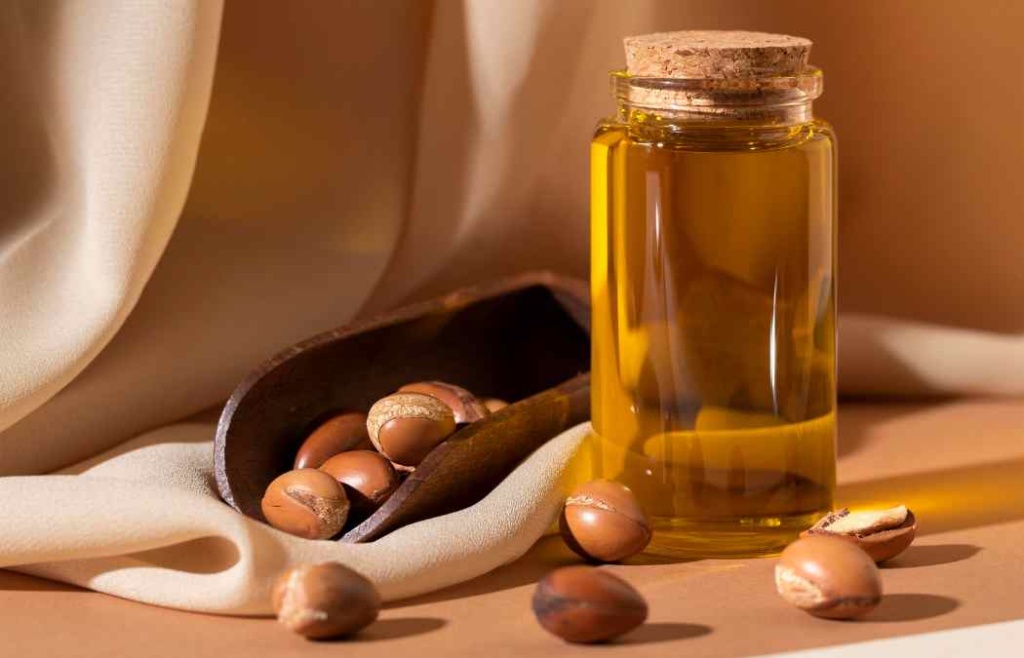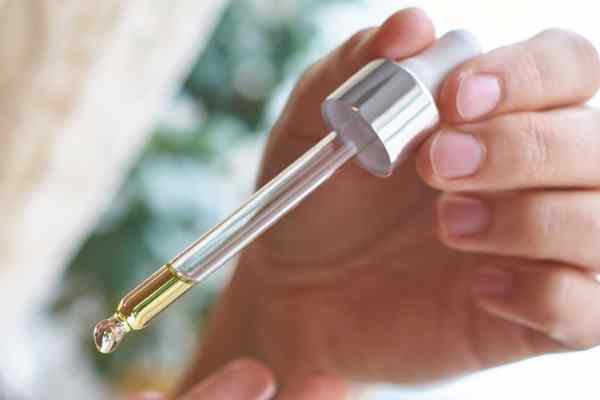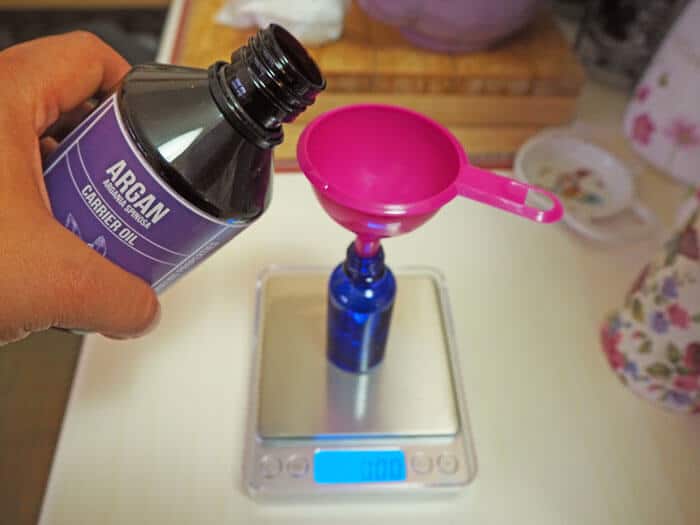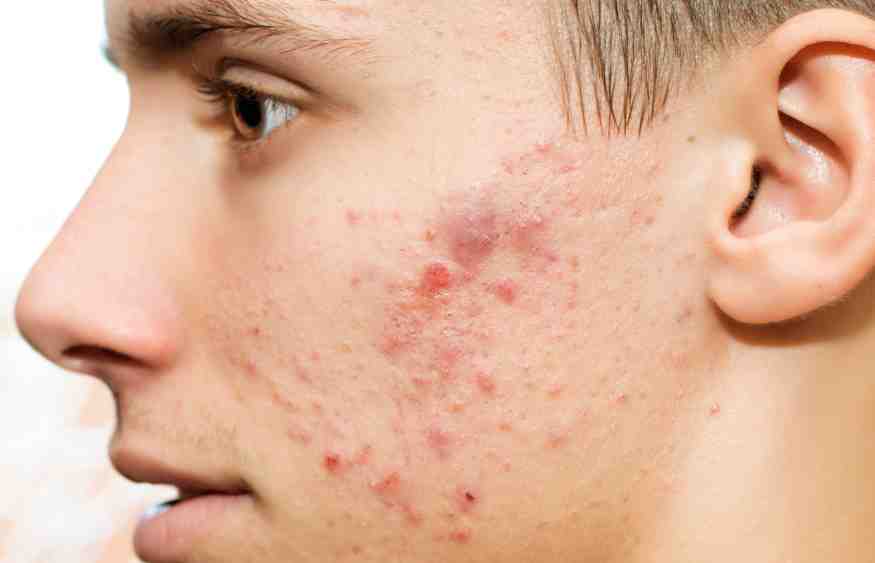Can Argan Oil Cause Acne? Understanding Clogged Pores and Argan Oil’s Effects
Argan oil is derived from the nuts of the argan tree and is commonly used for its moisturizing and antioxidant properties.
Argan oil is generally considered non-comedogenic, meaning it is unlikely to clog pores or cause acne breakouts for most people. However, everyone’s skin is different, and some individuals may be more sensitive to certain ingredients, including argan oil.

Argan oil can be beneficial for acne-prone skin due to its non-comedogenic nature and numerous skin benefits.
AFFILIATE COMMISSION DISCLAIMER: I may earn a commission from affiliate links in this article at no extra cost to you.
Can Argan Oil Cause Acne?
Can argan oil cause acne? The non-comedogenic nature of argan oil makes it less likely to clog pores and cause breakouts, but it’s important to remember that everyone’s skin is different, and individual sensitivities and reactions can vary.
Argan oil, rich in vitamin E and other nourishing components, has long been used to moisturize and protect the skin from damage. It is often applied directly to the face as a moisturizer, but it’s crucial to patch test any new product, including argan oil, before applying it to your entire face. This can help minimize the risk of side effects or adverse reactions.
| Key Points | Explanation |
|---|---|
| Non-comedogenic | Argan oil is less likely to clog pores and cause acne |
| Individual sensitivities | Everyone’s skin is different; reactions can vary |
| Patch testing | Test new products on a small area before full-face use |
Argan oil has many benefits for the skin, and its non-comedogenic nature makes it a suitable choice for people with acne-prone skin. However, if you notice any adverse reactions or worsening of your acne after using argan oil on your skin, it’s essential to discontinue its use and consult a dermatologist or skincare expert.
While argan oil is generally considered safe for most skin types and unlikely to cause acne, individual reactions can vary. Always patch test new products and monitor your skin’s response to ensure the best possible outcome for your unique skincare needs.

About Oils and Acne
Oils and acne, quite the conundrum! It’s easy to assume that oils are the enemy of acne-prone skin, but that’s not always the case. So let’s dive into this slippery subject and explore the relationship between these two.
First things first, not all oils are created equal. Some, like argan oil, are non-comedogenic, meaning they won’t clog pores or cause breakouts. In fact, argan oil is often praised for its acne-reducing properties, thanks to its rich vitamin content and ability to moisturize without causing greasiness.
Now, you might be wondering – how can an oil help with acne? Seems counterintuitive, doesn’t it? Well, here’s the thing: certain oils can actually improve your skin’s barrier function, helping to lock in moisture, reduce inflammation, and promote healing. Plus, when you apply oils to your skin, they can mimic your skin’s natural oil (sebum) production, which can help to balance things out and even prevent future breakouts.
| Oils and Acne | What to Know |
|---|---|
| Argan Oil | Non-comedogenic, rich in vitamins, can help reduce acne and inflammation |
| Application | Apply directly to the face, use as a moisturizer, or mix with other skincare products |
| Skin Types | Beneficial for various skin types, but individual reactions may vary |
But (and there’s always a but) what works for one person may not work for another. So it’s crucial to pay attention to your skin’s unique needs and reactions. If you’re considering incorporating an oil like argan oil into your skincare routine, start with a patch test to make sure it won’t cause any irritation or breakouts.
It is essential to understand that oils and acne aren’t always at odds. With the right oil and a mindful approach, you can nourish your skin while keeping those pimples at bay. So go ahead – give oils a chance, and you might just find your new skincare BFF.
Comments & Advice as a Certified Skincare Formulator & Technician

How does argan oil work on the skin to help reduce breakouts?
When you apply argan oil to your skin, you’re providing it with a natural oil that resembles the skin’s own sebum. This can help signal to the skin that it doesn’t need to produce excess oil. As a result, the skin’s sebum production may become more balanced, preventing overproduction and reducing the risk of clogged pores and acne breakouts. This is particularly helpful for people with oily or combination skin types, as it can help maintain a healthy balance of natural oils on the skin’s surface.
Trying argan oil safely, what to watch out for, and when to expect results
My advice for trying argan oil safely:
- Conduct a patch test to check for any sensitivities or reactions.
- If no adverse reactions occur, incorporate argan oil into your skincare routine for 2 weeks to 1 month, using a few drops both day and night.
- Assess the results and adjust your routine accordingly based on your skin’s response.
When evaluating the results of using argan oil in your skincare routine, consider the following:
- Check for improvements in skin hydration, texture, and overall appearance. Argan oil is known for its moisturizing properties and can help reduce dryness or flakiness.
- Look for signs of reduced inflammation, redness, or irritation, as argan oil possesses anti-inflammatory properties that may help calm acne-prone skin.
- Assess any changes in acne breakouts, such as reduced frequency, severity, or healing time.
- Monitor your skin’s overall health, including its elasticity, brightness, and tone, as argan oil is rich in antioxidants and essential fatty acids that can help support healthy skin.
If you notice positive changes in your skin’s condition after consistently using argan oil, it may be a valuable addition to your skincare routine. However, if you experience any adverse effects or no improvement, consider consulting with a dermatologist or trying alternative non-comedogenic oils or products designed for acne-prone skin, more info in this article, below.
When using argan oil in your skincare routine, you can expect the following changes and the approximate timeframes:
- Improved skin hydration: You may notice an immediate improvement in skin hydration, as argan oil is an effective moisturizer. With regular use, your skin may feel softer and smoother within a week or two.
- Reduced inflammation and redness: Argan oil’s anti-inflammatory properties may help calm irritated or acne-prone skin. You could start seeing a decrease in inflammation and redness within a few days to a week.
- Fewer acne breakouts: As argan oil is non-comedogenic, it may help reduce the frequency and severity of acne breakouts. This change may take anywhere from a few weeks to a month to become apparent as your skin adjusts to the new product.
- Improved skin health: Over time, with consistent use, you may notice improvements in your skin’s overall health, such as increased elasticity, brightness, and even tone. These changes typically occur gradually and may take a few weeks to a few months to become noticeable.
Remember that individual experiences may vary, and results depend on factors such as your skin type, the severity of your acne, and your overall skincare routine. Always monitor your skin’s reaction to new products, and consult a dermatologist if you have concerns or do not see the desired results.
How argan oil helps to help reduce breakouts
Argan oil works on the skin in several ways to potentially result in fewer breakouts:
- Non-comedogenic: Argan oil is non-comedogenic, meaning it doesn’t clog pores. Clogged pores can lead to acne breakouts, so using non-comedogenic oils like argan oil may reduce the likelihood of new pimples forming.
- Balancing sebum production: Argan oil can help balance the skin’s natural oil (sebum) production. Overproduction of sebum is a common cause of acne, as excess oil can mix with dead skin cells and clog pores, leading to breakouts. By normalizing sebum production, argan oil may contribute to a reduced risk of acne development.
- Anti-inflammatory properties: Argan oil has anti-inflammatory properties that can help soothe and calm irritated skin. Inflammation can exacerbate acne, so by reducing inflammation, argan oil may help minimize the severity of breakouts.
- Antioxidant effects: Argan oil is rich in antioxidants, particularly vitamin E, which can help protect the skin from damage caused by free radicals. By neutralizing free radicals, argan oil may promote healthier skin and reduce the risk of acne breakouts.
- Skin barrier support: Argan oil can help strengthen the skin’s natural barrier, retaining moisture and protecting against irritants and bacteria that can contribute to acne development.
Let’s Get Started Investigating Argan Oil, Clogged Pores & the Oil’s Effects!
Argan oil has taken the skincare world by storm, and it’s no wonder why!
This versatile natural oil is chock-full of benefits for all skin types. From serving as a nourishing moisturizer for dry skin to providing protection for your precious complexion, there are countless reasons to give argan oil a try.
I use it very regularly and absolutely love it (I am addicted to the scent, it is intoxicating). Apt for mature skin, young skin, combination skin, oily skin and more, this oil is an absolute wonder (and amazing for both the skin AND hair).
As an accredited natural skincare formulator with a wealth of experience and a CPD accreditation in skin care treatment, I’ve spent a significant amount of time studying and working with this remarkable oil. So, let me walk you through the ins and outs of argan oil and help you make an informed decision about whether it’s right for your skin.
Now, you might be wondering, “how do I use argan oil?” Well, it’s quite simple! Applying argan oil to your skin is as easy as massaging a few drops onto your face. This oil can help slough away dead skin cells, leaving you with a radiant glow. Plus, argan oil is rich in nutrients, antioxidants, and fatty acids, which can help reduce the appearance of fine lines and wrinkles.
But what about oily skin types? Can pure argan oil cause breakouts?
I understand your concern, and that’s why I’m here to shed light on the relationship between argan oil and acne. Stick around as we dive deep into whether argan oil can be used on oily skin and how it works to either help or hinder your skincare goals.
What is Argan Oil?
So, what exactly is argan oil, and where does it come from? Argan oil is derived from the kernels of the argan tree1, native to Morocco. The extraction process involves careful pressing of the kernels to obtain the precious oil, which is renowned for its numerous benefits for both skin and hair.

The chemical composition of argan oil is truly impressive, with a mix of nutrients, antioxidants, and fatty acids that work wonders for maintaining healthy skin2. These properties not only protect the skin but also contribute to improved skin elasticity, helping to reduce the appearance of acne scars3.
Now, one of the most pressing concerns for many people is whether argan oil clogs pores. The good news is that argan oil is generally considered non-comedogenic, meaning it’s unlikely to cause clogged pores or aggravate oily or acne-prone skin. This is because argan oil contains a balanced ratio of oleic and linoleic acids4, which helps regulate oil production while keeping your skin moisturized and healthy.
| Argan Oil Properties | Benefits for Skin |
|---|---|
| Antioxidants | Protects the skin from free radicals and environmental damage |
| Fatty acids | Helps maintain skin elasticity and supports the skin’s barrier function |
| Vitamin E | Nourishes and supports skin repair |
| Non-comedogenic | Less likely to clog pores or cause breakouts |
When applying argan oil on your face, just a few drops are enough to deliver these benefits without causing skin irritation (always perform a patch-test). It’s essential to remember that argan oil works differently for everyone, and while it may be a great option for some, it might not be ideal for others.
So, yes, argan oil is generally considered safe and beneficial for most skin types, thanks to its non-comedogenic nature and wealth of skin-loving ingredients. But, as with any skincare product, it’s crucial to monitor your skin’s response and adjust your routine accordingly.

Benefits of Argan Oil for Skin
With its multitude of benefits, argan oil has become a popular addition to many skincare routines. Being non-comedogenic, as we saw before, argan oil does not clog pores, making it suitable for both oily and acne-prone skin, thanks to its chemical composition.
Let’s delve deeper into the various benefits of using argan oil for your skin which might interest you.
Argan oil is rich in antioxidants, including vitamin E, which help protect the skin against free radical damage5 caused by environmental factors such as pollution and sun exposure. These protective properties of argan oil can also shield the skin from damage caused by harmful UV rays.
One of the standout features of argan oil is its ability to hydrate and nourish the skin. It’s fatty acids and natural emollient properties help lock in moisture, ensuring your skin stays supple and radiant. This makes argan oil an excellent facial oil for both daytime and nighttime use. Many people prefer to use argan oil at night to maximize its nourishing effects.
| Benefits of Argan Oil | How it Works |
|---|---|
| Antioxidant protection | Argan oil is rich in antioxidants, including vitamin E, which help to protect the skin from environmental damage |
| Moisturization and nourishment | Argan oil’s fatty acids and emollient properties help to hydrate and nourish the skin |
| Anti-aging effects | Argan oil may help to reduce the appearance of fine lines and wrinkles by improving skin elasticity and firmness |
| Healing properties | Argan oil has anti-inflammatory properties that can soothe irritated skin and promote healing |
Argan oil also has anti-inflammatory properties6, making it a powerful ally in soothing irritated or inflamed skin. This versatile oil can help reduce redness and inflammation associated with various skin conditions, providing a gentle yet effective solution for sensitive skin.
- Argan oil is non-comedogenic, making it suitable for oily and acne-prone skin.
- Rich in antioxidants like vitamin E, argan oil helps protect the skin from environmental damage and sun exposure.
- The fatty acids and natural emollient properties of argan oil help to hydrate and nourish the skin.
- Argan oil may improve skin elasticity and firmness, reducing the appearance of fine lines and wrinkles.
- With anti-inflammatory properties, argan oil can soothe irritated skin, reduce redness, and promote healing.
- Suitable for both daytime and nighttime use, argan oil can be a versatile addition to your skincare routine.
In short, incorporating argan oil into your skincare routine can offer a wide range of benefits. From nourishing and protecting the skin to promoting healing and reducing signs of aging, this natural oil is a skincare gem.
As with any skincare product, it’s essential to monitor your skin’s response to argan oil and adjust your routine as needed to achieve the best results.
Always monitor your skin’s response to argan oil and adjust your routine as needed to achieve the best results.
Understanding Acne and Its Causes
Now that we’ve covered the benefits of argan oil, let’s take a closer look at acne and its causes. Understanding the different types of acne and the factors contributing to its development will help us better evaluate the role of argan oil in acne management.
Acne comes in various forms, ranging from mild to severe. These include blackheads, whiteheads, papules, pustules, nodules, and cysts.
The main factors contributing to acne development are:
- Excess oil production by the skin7
- Accumulation of dead skin cells in hair follicles
- Bacterial growth within hair follicles
- Inflammation
| Types of Acne | Description |
|---|---|
| Blackheads | Open comedones with a dark surface caused by oxidized sebum |
| Whiteheads | Closed comedones with a white or flesh-colored surface |
| Papules | Small, red, inflamed bumps |
| Pustules | Red, inflamed bumps with a pus-filled head |
| Nodules | Large, painful, solid lumps beneath the skin |
| Cysts | Deep, painful, pus-filled lumps beneath the skin |
Comedogenic ingredients in skincare products can contribute to acne by clogging pores and trapping the skin’s natural oil and dead skin cells. This is why it’s crucial to choose non-comedogenic products like argan oil, which is less likely to cause breakouts.

Argan oil is a natural oil extracted from the seeds of the argan tree, and it’s often used as a moisturizer to nourish and protect the skin. I add it to many of my DIY skincare formulations. The antioxidant activity in argan oil can also help protect the skin from sun damage, making it a versatile addition to your skincare routine.
When applying argan oil to your face, make sure to do a patch test first to avoid any potential side effects or adverse reactions.
REMEMBER: If you have questions about using argan oil as an ingredient in your skincare routine, it’s always best to consult a dermatologist or a skincare expert to ensure it’s the right choice for your unique skin needs.
How to Incorporate Argan Oil into Your Skincare Routine
Are you ready to give argan oil a go? Here’s how to incorporate this versatile, non-comedogenic oil into your skincare routine, reaping its many benefits while minimizing the risk of side effects.
- Recommended usage and application methods: Argan oil can be applied directly to the face as a moisturizer or mixed with other skincare products. A little goes a long way, so start with just a few drops and gently massage it into your skin. You can use argan oil in the morning or evening, but many people prefer to apply it at night to maximize its nourishing effects.
- Identifying high-quality argan oil: Not all argan oils are created equal. Look for 100% pure, cold-pressed, and organic argan oil to ensure you’re getting the best quality product. High-quality argan oil will have a light, nutty scent and a golden-yellow color. Here is my recommended one (Amazon affiliate link).
- Combining argan oil with other skincare products: Argan oil can be used alongside other skincare products, like serums and creams, to enhance their effects. You can mix argan oil with your favorite moisturizer for added hydration or blend it with a few drops of essential oil for an aromatic experience. Just be mindful of your skin’s reaction when combining products and adjust accordingly.
| Tips for Incorporating Argan Oil | Details |
|---|---|
| Application methods | Apply directly to the face or mix with other products; use a few drops and massage into skin |
| Choosing high-quality oil | Look for 100% pure, cold-pressed, and organic argan oil |
| Combining with other products | Mix with moisturizers, serums, or essential oils for added benefits |
Remember, when trying out argan oil, it’s essential to monitor your skin’s response and adjust your routine as needed. And don’t forget to do a patch test before applying it to your entire face! With the right approach, argan oil can become a valuable addition to your skincare arsenal, helping you achieve a radiant, healthy complexion.
Precautions and Considerations
Before diving headfirst into the world of argan oil, it’s wise to consider a few precautions. After all, nobody wants an unexpected reaction, right? So, let’s take a moment to explore possible side effects, allergic reactions, and the importance of consulting a dermatologist.
First things first, keep in mind that while argan oil is generally considered safe, there are some potential side effects. For instance, some people might experience irritation, redness, or itching. But don’t worry – these reactions are pretty rare.
Now, when it comes to allergies, that’s a whole different ball game. Some people may be sensitive to argan oil or its components, leading to some allergic reactions. That’s why it’s crucial to do a patch test before slathering argan oil all over your face. Better safe than sorry!
Last but not least, if you’re unsure about introducing argan oil into your skincare routine or have a history of skin issues, it is always a good idea to consult a dermatologist. Check my article here on when to consult a dermatologist. They are the experts in the field and can provide personalized advice tailored to your unique skin needs.
| Precaution | Tips & Considerations |
|---|---|
| Possible side effects | Be aware of potential irritation, redness, or itching |
| Allergic reactions | Perform a patch test to avoid unwanted reactions |
| Consultation with a dermatologist | Seek professional advice, especially if you have a history of skin issues |
So, there you have it! When it comes to argan oil, a bit of caution can go a long way. Just remember to be mindful of possible side effects, test for allergies, and consult a dermatologist when in doubt. With these considerations in mind, you’ll be well on your way to reaping the bountiful benefits of this amazing oil.
Alternatives to Argan Oil for Acne-Prone Skin
So, let’s say you’ve given argan oil a shot, but it’s just not quite the right fit for your acne-prone skin. Don’t worry – you’re not out of options.
There’s a whole world of alternatives waiting for you to explore. From other non-comedogenic oils to acne-fighting skincare ingredients, we’ve got you covered.
First up, let’s talk about other non-comedogenic oils that won’t clog your pores. These beauties are perfect for folks who still want to enjoy the benefits of a natural oil without the risk of breakouts. A few favorites include rosehip oil, hemp seed oil, and jojoba oil – each with their unique profiles for different skin types.
Now, moving on to acne-fighting ingredients. These skincare superheroes can help keep those pimples at bay. Salicylic acid, benzoyl peroxide, and niacinamide are popular choices, known for their unclogging and anti-inflammatory powers. But remember, it’s essential to find the right balance – too much of a good thing can sometimes lead to irritation.
| Alternatives to Argan Oil | Benefits for Acne-Prone Skin |
|---|---|
| Rosehip Oil | Rich in vitamins A and C, helps with skin cell regeneration, and reduces inflammation |
| Hemp Seed Oil | High in omega-3 and omega-6 fatty acids, soothes irritated skin, and balances oil production |
| Jojoba Oil | Mimics skin’s natural oil, reduces excess sebum, and moisturizes |
| Salicylic Acid | Exfoliates and unclogs pores, reduces inflammation |
| Benzoyl Peroxide | Kills acne-causing bacteria, unclogs pores |
| Niacinamide | Reduces inflammation, regulates oil production, and improves skin texture |
So, there you have it – a handy guide to alternatives for argan oil that’ll help you combat acne and maintain that gorgeous glow.
Just remember, everyone’s skin is different, so take your time to find the perfect match for your unique needs.
And as always, if you’re ever unsure, don’t hesitate to reach out to a dermatologist for some expert advice.
Conclusion
Alrighty, let’s wrap this up! We’ve covered a lot of ground, from argan oil’s non-comedogenic nature to its potential benefits for acne-prone skin. Remember, this golden oil is rich in vitamins and has been used for centuries to protect and nourish the skin. Plus, it can help reduce inflammation and promote healing – a true skincare superhero!
Now, hold up – before you go slathering argan oil all over your face, it’s essential to remember that skincare is a highly individual game. Just because something works for your best friend or favorite influencer doesn’t mean it’s a surefire win for you. So listen to your skin and adjust your routine accordingly.
And hey, if you’re feeling a bit lost or unsure, don’t be shy about seeking professional guidance. After all, dermatologists and skincare experts are here to help. They can assess your skin’s unique needs and recommend the best course of action for your specific concerns. It is money well spent in the end and it can save you a lot of nightmares.
In conclusion, while argan oil may indeed be a fantastic addition to many skincare routines, it’s crucial to stay mindful of your individual skin type and potential sensitivities. With a little bit of trial and error (and maybe some expert advice), you can discover the perfect skincare cocktail to keep your skin happy, healthy, and blemish-free!
Frequently Asked Questions
Q: Is it true that argan oil won’t clog pores?
A: Argan oil is non-comedogenic, meaning it doesn’t clog pores. This makes it a fantastic option for folks with acne-prone skin.
Q: Can I use argan oil on my acne-prone skin?
A: Absolutely! Argan oil can help reduce inflammation and promote healing, making it a nifty addition to your skincare arsenal. Just remember, everyone’s skin is unique, so pay attention to how your skin reacts.
Q: Are there any side effects of argan oil I should be aware of?
A: While argan oil is generally gentle and well-tolerated, some people may experience skin sensitivities or allergies. It’s always a good idea to patch test new products before applying them to your face.
Q: How do I apply argan oil to my face?
A: Warm a few drops of pure argan oil between your fingertips and gently press it onto your clean, damp face. You can use it as a moisturizer or mix it with your favorite skincare products.
Q: What are the properties of argan oil that make it beneficial for acne-prone skin?
A: Argan oil is packed with antioxidants, vitamins, and anti-inflammatory properties, which can help soothe, nourish, and protect your skin. Plus, it doesn’t clog pores, making it a winner for acne-prone folks.
Q: Can argan oil cause breakouts?
A: While argan oil is non-comedogenic and generally well-tolerated, everyone’s skin is different. If you have a sensitivity or allergy to argan oil, it could potentially cause breakouts. Always patch test and listen to your skin!
Q: Does pure argan oil cause clogged pores?
A: Pure argan oil is non-comedogenic, meaning it won’t clog your pores. This makes it a great choice for people looking to keep their skin clear and healthy.
In conclusion, just a few drops of argan oil can work wonders for your skin. Being non-comedogenic, it won’t clog pores and is suitable for various skin types. Applying it directly to your face can help reduce inflammation and promote healing. It’s also known for its moisturizing properties and can be used as a facial oil or mixed with other skincare products. Argan oil has long been used to protect the skin from sun damage and environmental stressors, thanks to the antioxidants and vitamins it contains. So go ahead, give this versatile oil a try, and experience the benefits of this natural skincare gem extracted from the argan tree.
References
- Mechqoq, Hicham, et al. “Ethnobotany, Phytochemistry and Biological Properties of Argan Tree (Argania Spinosa (L.) Skeels) (Sapotaceae) – A Review.” Journal of Ethnopharmacology, vol. 281, Dec. 2021, p. 114528. ScienceDirect, https://doi.org/10.1016/j.jep.2021.114528.
- Qiraouani Boucetta, Kenza, et al. “The Effect of Dietary and/or Cosmetic Argan Oil on Postmenopausal Skin Elasticity.” Clinical Interventions in Aging, vol. 10, Jan. 2015, pp. 339–49. PubMed Central, https://doi.org/10.2147/CIA.S71684.
- Villareal, Myra O., et al. “Activation of MITF by Argan Oil Leads to the Inhibition of the Tyrosinase and Dopachrome Tautomerase Expressions in B16 Murine Melanoma Cells.” Evidence-Based Complementary and Alternative Medicine : ECAM, vol. 2013, 2013, p. 340107. PubMed Central, https://doi.org/10.1155/2013/340107.
- Gharby, Said, and Zoubida Charrouf. “Argan Oil: Chemical Composition, Extraction Process, and Quality Control.” Frontiers in Nutrition, vol. 8, Feb. 2022, p. 804587. PubMed Central, https://doi.org/10.3389/fnut.2021.804587.
- Niki, Etsuo. “Evidence for Beneficial Effects of Vitamin E.” The Korean Journal of Internal Medicine, vol. 30, no. 5, Sept. 2015, pp. 571–79. PubMed Central, https://doi.org/10.3904/kjim.2015.30.5.571.
- Menni, Hanane Ben, et al. “Anti-Inflammatory Activity of Argan Oil and Its Minor Components.” International Journal of Food Sciences and Nutrition, vol. 71, no. 3, May 2020, pp. 307–14. PubMed, https://doi.org/10.1080/09637486.2019.1650005.
- Endly, Dawnielle C., and Richard A. Miller. “Oily Skin: A Review of Treatment Options.” The Journal of Clinical and Aesthetic Dermatology, vol. 10, no. 8, Aug. 2017, pp. 49–55. PubMed Central, https://www.ncbi.nlm.nih.gov/pmc/articles/PMC5605215/.

